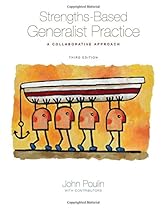Strengths-Based Generalist Practice: A Collaborative Approach (Methods / Practice of Social Work: Generalist) .This book is intended for Generalist Social Work Methods and practice courses offered in departments of social work and human services at both the undergraduate and graduate levels

| Title | : | Strengths-Based Generalist Practice: A Collaborative Approach (Methods / Practice of Social Work: Generalist) |
| Author | : | |
| Rating | : | 4.76 (346 Votes) |
| Asin | : | 0495115878 |
| Format Type | : | Paperback |
| Number of Pages | : | 672 Pages |
| Publish Date | : | 2009-03-02 |
| Genre | : |
This book is intended for Generalist Social Work Methods and practice courses offered in departments of social work and human services at both the undergraduate and graduate levels.
Editorial : "Very good skills builder for general practice. Strengths include good discussions on history, theory, ethics and values and poverty."
"(Students) have said that it is the first social work text that they have enjoyed reading. I consider that high praise and I agree with it. The entire book is neither dull nor mired in jargon. It is useful from start to finish."
"It is clear, precise and easy to read. The students like it very much."
However a potential reader is warned that the anecdotes might get a little annoying (though one can simply ignore them) and those with limited theoretical knowledge should look elsewhere. He's fascinated with the animals only. This a sweet addition to our book collection! Our toddlers enjoy Elmer the Dancing Pig!. It is also interesting to see why Kuba behaves the way he does towards Adachi. It gives you the history of corrections along with correction policies that are used today. The only thing was that the date boxes were also covered with the high shine gloss that made the pictures and quality outstanding, which made it difficult to write on. Today's successful marketing strategy is totally different from those even ten years ago. Our local music teachers association has a theory test each year, and every year my students and I laugh at the "analysis" section of the test: after the students get done answering 50 questions proving their knowledge of scales, chords, intervals, etc. I


Tidak ada komentar:
Posting Komentar